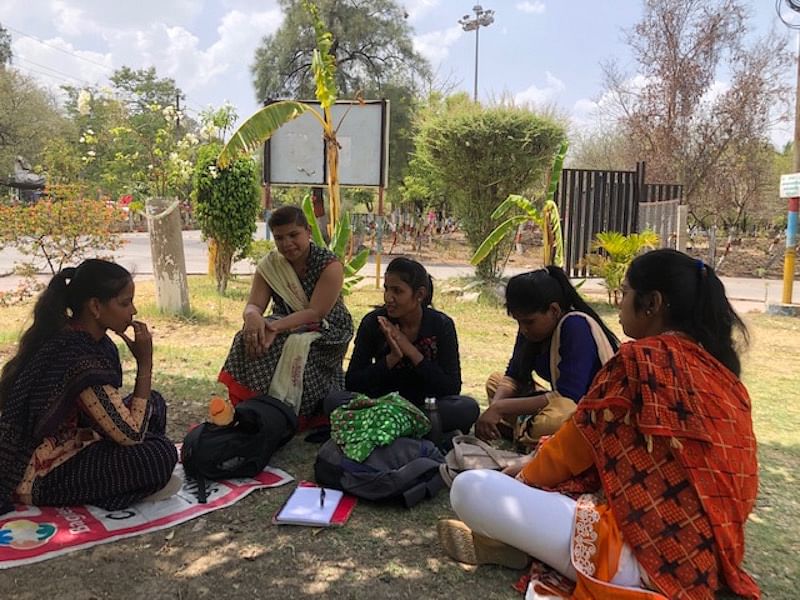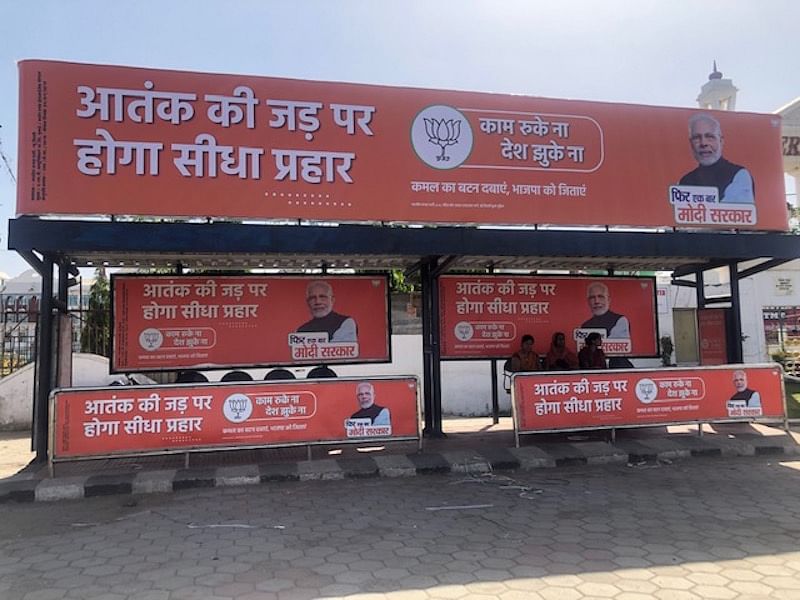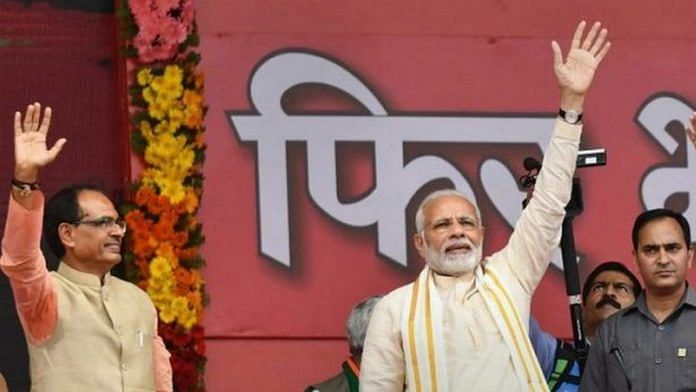Indore/Bhopal: Strong, decisive leadership, the ability to protect and promote the country and show Pakistan its place, welfare initiatives, vikas, honesty and his style of working — these are some of the reasons why voters in Madhya Pradesh want to see Narendra Modi re-elected as Prime Minister of India.
There are 29 Lok Sabha seats up for grabs in the state, of which the BJP had won 27 in 2014. This time around, the BJP is going the extra mile to hang on to as many as it can, while the Congress is trying its best to reduce the advantage.
Amid all the national and local issues, leaders’ rallies and promises, there is one dominant narrative that finds resonance across the women-men, young-old and rural-urban divides — brand Modi. And this is true right across the state, from Mandsaur to Jabalpur, Indore to Bhopal and Dewas to Guna.
This stands in stark contrast to the opposition — there is no single leader who can give Modi a run for his money on a national scale, and the parties have been unable to corner the PM and the BJP on their vulnerabilities and the government’s failures.
‘Tough decisions’
A group of young female students sits huddled together on the lawns of Devi Ahilya Vishwavidyalaya’s Takshashila campus in Indore, seemingly oblivious to the searing heat.
The students, all preparing for competitive exams, exchange study notes, but take breaks to discuss the flavour of this summer — the Lok Sabha elections.
“Modi should be prime minister,” they say unanimously, after some initial hesitation, going on to talk at length about his leadership and the development that has taken place under him.

In fact, some voters who back the BJP say they are doing so for Modi and not because of their local candidate. In that sense, somewhere, the ‘Modi is BJP and BJP is Modi’ narrative is complete, for the moment at least.
Perhaps, it is the years of policy paralysis and seeming lack of direction that came to define the last few years of the previous Congress-led UPA regime that make Modi’s five-year term appear “decisive”. Or perhaps it is a range of his government’s decisions — from demonetisation to the rollout of the Goods and Services Tax (GST), the 2016 surgical strikes or the recent air strikes by the Indian Air Force on terror camps in Balakot, Pakistan, that play to the image of Modi being a “strong” leader.
In comparison, the Congress, which formed the government in Madhya Pradesh in December 2018, has largely seemed to be fumbling, which makes Modi look all the more “in-control”.
A sizeable proportion of voters talk about Modi’s ability to take “tough decisions”. The Balakot air strike, in response to the terror attack in Pulwama, has added generously to this narrative, thanks to the sheer number of times the BJP’s top leadership has talked about it during the election campaign. Even demonetisation, as disastrous as it may have been according to economists, is cited by some as an example of Modi’s “boldness”.
“Modi ji takes very difficult decisions, which other leaders have not dared to. The attacks against black money — demonetisation, GST — and against Pakistan all show us that,” says Ashok Parmar of Sehore.
When reminded that demonetisation led to precious little, Parmar’s argument is it was “still a daring move”. This is a sentiment echoed by many in the state, and could give the BJP a big fillip.
Welfare and vikas
A range of the Modi government’s welfare initiatives seem to have major traction on the ground in Madhya Pradesh, most notably in rural areas. Among them, the Ujjwala Yojana and the Pradhan Mantri Awas Yojana are the most popular, with voters talking about them across the board.
Also read: ‘No other like Modi,’ they say in MP’s Mahakoshal after voting Congress in assembly polls
“Sadak mili hai, ghar mila hai, gas ki tanki mili hai — aur kya chahiye? Sab achha kiya hai Modi ji ne. (We have got roads, houses and gas cylinders. What else do we need? Modi has done good work),” says Billu Yadav of Budena village in Guna.
Among women, the Ujjwala scheme which provides free LPG connections to poor families, has been a huge hit. What have also worked are experiments like Swachh Bharat and the construction of toilets, which aren’t typically seen as political measures.
It is interesting to note that these schemes are associated with ‘brand Modi’, and not more generically with the BJP. It seems like clever marketing by the PM and his team — by attaching ‘Pradhan Mantri’ to the schemes’ names to plastering his face across hoardings and advertisements to talking about them ad nauseam in his speeches, Modi has ensured they become synonymous with him, not just his government.
“Vikas laye hain (he has ushered in development)” is another common refrain. Some cite infrastructure development like road construction and electrification of villages, while others talk about Start-up India and Make in India. The schemes themselves may or may not have worked, but have been picked up as catch-phrases.
Personality politics
What, however, works most in his favour is how successfully the BJP has turned this election into a ‘Modi versus others’ exercise. Congress president Rahul Gandhi’s Rafale narrative and that of the guard being a thief (“chowkidar chor hai”) does not seem to have caught on at all.
Also read: In Madhya Pradesh poll fight, Rafale is no match for Balakot
“Chowkidar kabhi chor nahi ho sakta. Jo aisa kehte hain woh khud chor hain. (The guard can never be a thief and those who say so are thieves themselves),” says Nitin Bishwakarma of Bhopal.
The fact that the opposition does not have one equally popular national leader also helps Modi. In the recent state elections in heartland states, for instance, the state leaderships of the Congress carried the party through. Even now, Congress leader Jyotiraditya Scindia remains very popular in his bastion Guna, and Chief Minister Kamal Nath in his stronghold, the Mahakoshal region. But at the central level, several voters cite the absence of an alternative as another reason they support Modi.

Some voters also talk about how Modi has made India a power internationally. “Even at the international level, the PM has done us proud and made our country powerful. He meets so many world leaders, negotiates with countries and that makes us a global power. Recently itself, Masood Azhar was declared a global terrorist,” says Deepika Parihar, a UPSC aspirant in Indore.
His humble beginnings, and the fact that he has shrewdly never let go of a chance to drill that in, also seem to resonate with people.
To be sure, there is a key section of people that do not like Modi or his policies — some dislike his “tall claims”, some his policy decisions, while others don’t like the BJP’s “communal” politics. Muslims, in particular, are deeply uncomfortable with Modi and the majoritarian Hindutva brand of politics he represents.
State of the opposition
Most importantly, it is the opposition’s inability to corner Modi on his vulnerabilities and his government’s failures, such as the lack of job creation and agrarian distress, that has further helped him.
These seem to be non-issues on the ground in Madhya Pradesh, with voters more interested in talking about Balakot and how the Congress is questioning it. Targeting Modi personally and questioning his integrity has only meant the PM has gained sympathy.
The Congress’ victory in the December 2018 assembly elections in the state by a whisker also means a few months of anti-incumbency has seeped in against it.
Dheeraj Singh Rajput of Bansapur village in Sehore sums it up rather dramatically. “Mamaji haar gaye the, par ab Nanaji ko nahi haarne denge (‘Uncle’ Shivraj Singh Chouhan lost, but we won’t let ‘Grandfather’ Modi lose),” he says.




Biased reporting from the print is the least i can expect. ThePrint is renowned and such kind of reporting is disappointing and distasteful. Please post news and ground reports of journalists that are unbiased and bold.
Why maximum number of anti Modi are Christians and Muslims, is it not an agenda
What a nonsense article? Brand modi or chowkidar chor he? All of India know about modi and ambani!